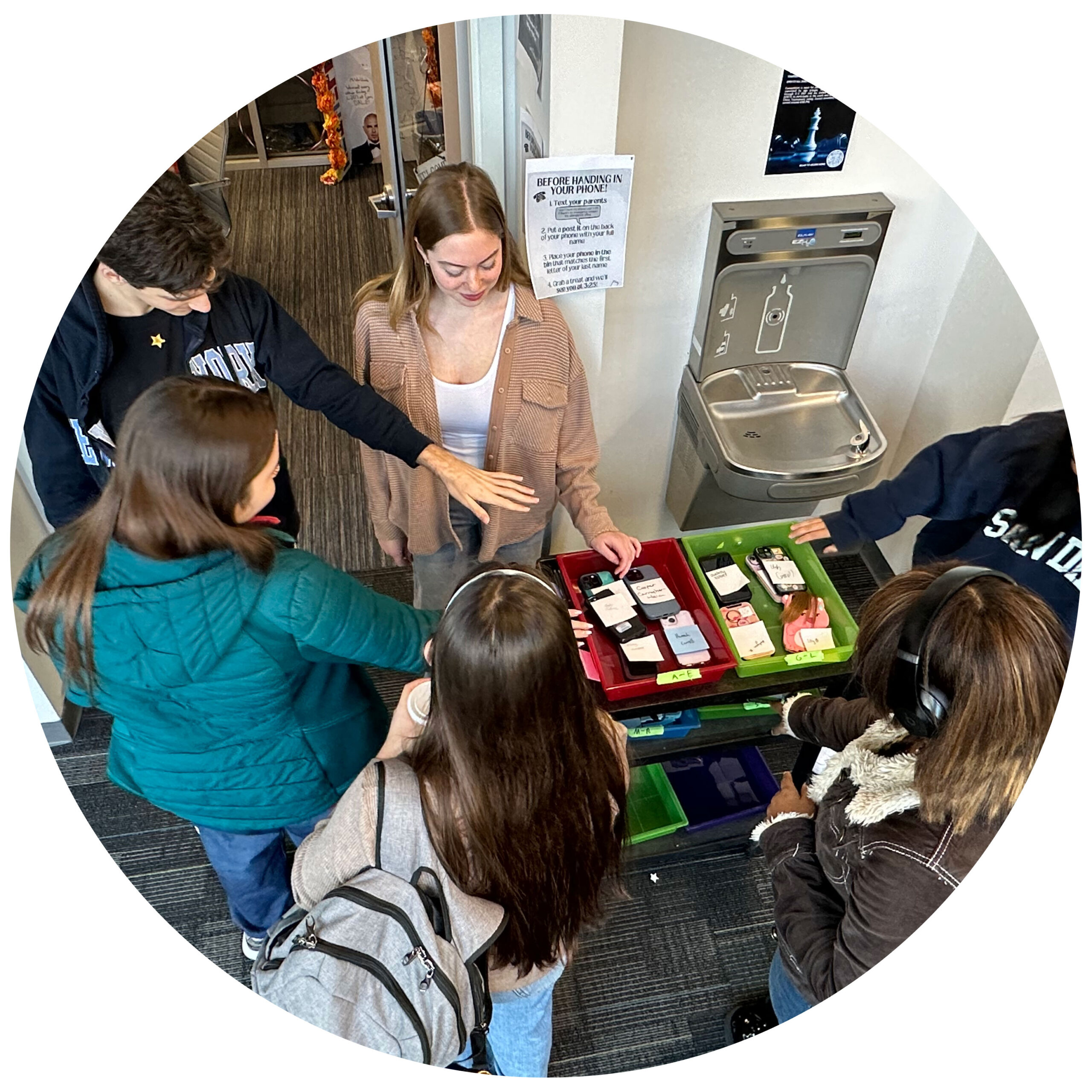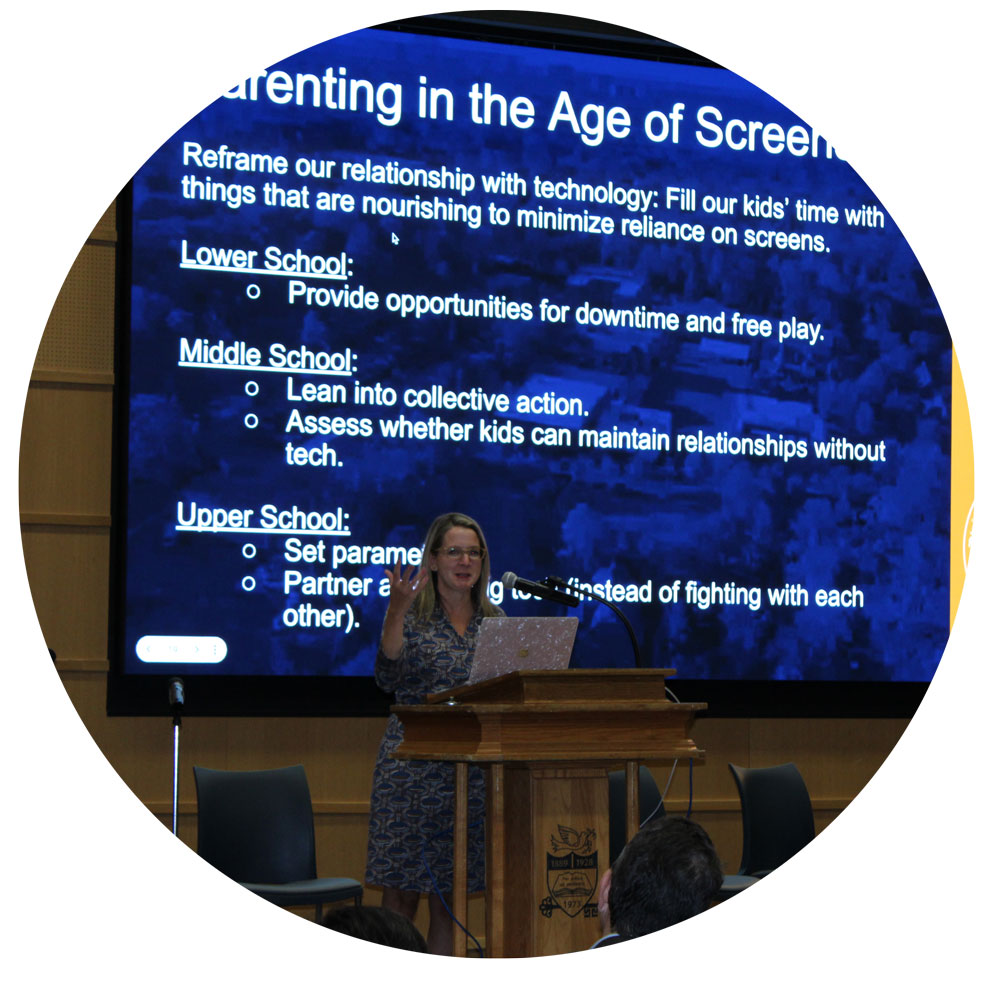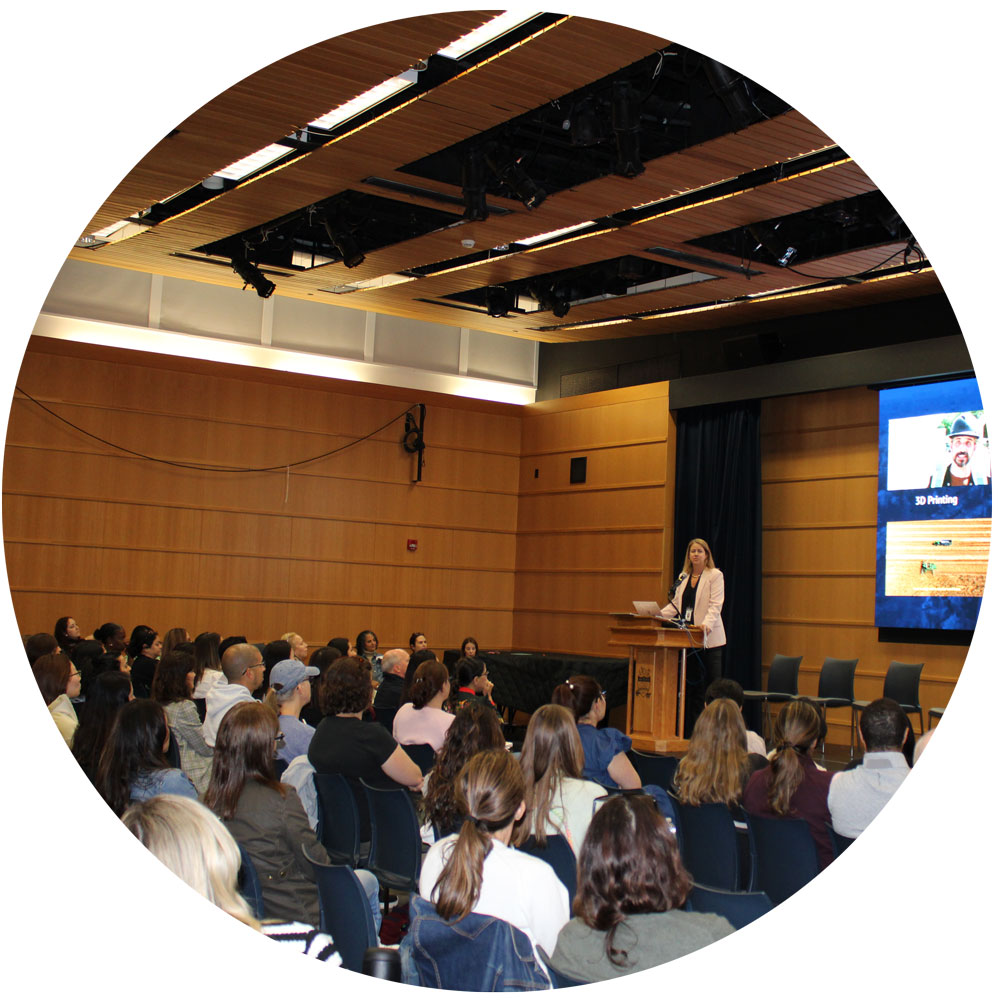Digital Wellness has been top of mind at D-E, just as it has on a broader scale in recent years with the release of data highlighting the harm that social media and excessive screen time can have on kids. To this end, the D-E Parent Ed. Committee hosted a Digital Wellness event in September, facilitated by Diana Gross, D-E’s Chief Innovation Officer.
Upper School senior Georgia Unger ’25 spoke at this event to discuss the topic from a student’s perspective. Georgia and her sister, Jane Unger ’25, had organized a “Phone Cleanse” event for US students last spring and led another one in November, during which students could voluntarily hand in their phones to the Student Activities Center for the day in exchange for access to a “VIP Club” with free bottled drinks and treats.
Georgia says soon after last year’s event, D-E students Ezra Newman ’26, Madigan Kacmar ’26, and Anna Ibarguen ’26 expressed interest in joining the movement. “They have begun helping me this year and plan to take over the [Phone Cleanse] when Jane and I graduate,” says Georgia. “They also have some great ideas of their own.”
“It’s beautiful that there are students leading Digital Wellness efforts,” says Ms. Gross. “What resonated with me the most from Georgia was her description that we don’t have an addiction to technology; we have bad habits.”
Ms. Gross asked Georgia to give her reflections on the Phone Cleanse and plans for future initiatives. Below is their exchange, edited for clarity and conciseness.
Ms. Gross: Please elaborate on why you and a few of your fellow students helped organize D-E’s Phone Cleanse Day. Why was this an important initiative?
Georgia Unger: I originally started this because I was annoyed by my own phone habits as well as the habits of my friends. We spent lunch hunched around our phones, and then I would get home from school and immediately go on my phone when I had things to get done. In looking at some research others had done, I realized this issue wasn’t all that hard to fix.
I found that the Phone Cleanse was a good way to make ourselves aware of this habit of excessive phone usage. Looking into some data for a paper in Honors English Seminar last year, the numbers astounded me. Mental health for teenagers takes a huge dive the second phones are given to them, while suicide rates and attention disorders skyrocket.
As I began talking to kids in the community it became clear to me that phone usage was on a spectrum. There were kids that had completely healthy relationships with their phones and would basically throw them in their backpack for the whole day. Then there were kids who literally told me they could not go a day without their phones.
The reality is that most of us are in the middle—we go on our phones out of boredom or because our friends are doing it. And for those kids, I think something like a Phone Cleanse can really help show them their habits and how they can work to change them.
Ms. Gross: Do you think this type of event is something we should do more frequently?
“The whole point of the Phone Cleanse is that it is manageable.”
Georgia: Definitely! We plan to organize more Phone Cleanses in 2025. We also are considering doing a “Phone-Free Friday” series, which would be a repeating event where students would have the option to hand in their phones every Friday. It would be a contest to see who could do this the most. goo
Ms. Gross: Have you experienced an improvement in your own well-being when you “turn off” the phone?
Georgia: Of course. I spend more time getting done what I need to, and I have better social interactions when I’m not distracted by my phone. One of the things I love about the Phone Cleanse is that there is inevitably a point in the day when you are standing somewhere with nothing to do, and you think about how you wish you had your phone. For me, I often become concerned about how many moments like these there are in a day, but I am then able to implement similar thinking when I do have my phone and I choose not to open it.
Ms. Gross: What type of feedback have you gotten from fellow students?
Georgia: We had participating students fill out a form at the end of the day and the last two questions asked for feedback and whether they would do it again. One hundred percent of participants said they would do it again, and most of the feedback we got was about specific snack choices. I continue to appreciate any student feedback.
Ms. Gross: Have we heard from parents, faculty, and staff regarding their impressions of the Phone Cleanse?
Three faculty members actually participated in the Phone Cleanse this year, which we appreciated, as the phone habit is definitely cross-generational. Many different faculty members and parents have reached out to me and shared their experience with either their own phone or their kids’ phones, wanting to get the perspective of a kid. Digital Wellness is an effort we should all take part in.
Ms. Gross: Do you have suggestions for ways to keep your screen time down on a regular basis?
Georgia: I am a fan of App Limits and Screen Time on the iPhone. These functions have helped me stay off social media for extended periods of time and they have also made it so that when I do access these apps it is with intentionality. One other thing I am a fan of is not sleeping with your phone next to your bed, or in your room at all. I personally charge my phone right outside my room so that I do not find myself lying in bed scrolling for hours on end.
Ms. Gross: How does the concept of Digital Wellness play out in manageable ways in general for students as well as families?
Georgia: The whole point of the Phone Cleanse is that it is manageable. It is a way that students can choose to begin the path to recovery from this habit. I think the fact that it is optional is one of the most important and helpful aspects. For most students, I think Digital Wellness does not mean never picking up a phone again—because in today’s world that’s unrealistic—but, rather, it means establishing a healthy relationship with the device.
As for Digital Wellness in family life, I think setting boundaries as a family can be helpful. One thing that can be frustrating to a student trying to kick the habit is if the parent is clearly not doing anything to help themselves do so. One example could be having simple rules like no phones at the dinner table.




